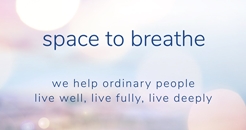 Space to Breathe - wellbeing for staff
Space to Breathe - wellbeing for staff
Space to Breathe is a social enterprise. They try and start meaningful conversations in organisations and communities around wellbeing and use spirituality, the arts and positive psychology to do this.
Who is involved? Andy Freeman founded Space to Breathe after working with the 24-7 Prayer and Church Mission Society movements. He is an expert in Franciscan and Ignatian Spirituality and has an MA in Theology from Oxford Brookes University. Ben Harper has been a youth worker, senior learning mentor, primary school teacher and the manager of a therapeutic service for children with complex social, emotional and mental health needs. Nicky Redsell has been a trainer at Ridley Hall Theological College, alongside providing pastoral and spiritual support for those based there. Steve Leach is an innovator and creative and brings those skills to a number of projects. They have a number of colleagues across UK.
In Education, they began some focused work nearly two years ago when they saw the true state of wellbeing and mental health challenges for school staff in the UK. They wanted to help good teachers stay in post, rather than feeling they have to leave due to stress which would impact numerous children and young people and eventually affect society. They are passionate about seeing school communities thrive.
So they began running “Soulful Wellbeing for School Staff” days. These days take teachers out of the classroom for the day and give them tools for self-care and to establish healthy habits around wellbeing. The day focuses on what they call a “Wellbeing Triangle”. They believe positive wellbeing involves an increased connectedness to our self, others and ‘Other’, which some people might call God. Their work draws wisdom from positive psychology, social anthropology and spirituality to help people live well, live fully and live deeply.
Their first pilot was a year ago and since then they’ve run at least 17 Wellbeing Days for teachers from over 20 schools.
After a while they began measuring wellbeing at the event and two months after for teachers who wanted to share that information and on average they’ve seen teacher wellbeing increase by 10 points on the Warwick Wellbeing Scale. This helpful data was coupled with 100% of attendees saying they’d recommend the training to colleagues and incredibly positive feedback to the content of the days themselves.
These first steps have then led them to start working with schools on workplace culture and on how they might support individual teachers and teams who need further support to their wellbeing.
Find out more here.
Retweet about this article:
Geoff Knott, 25/03/2020